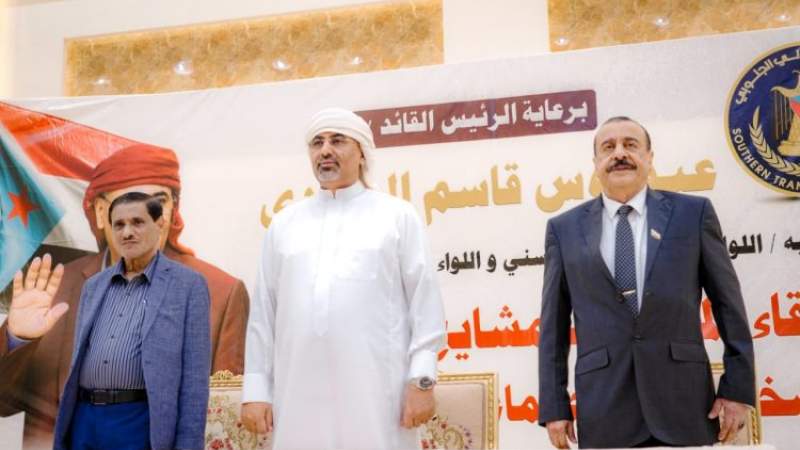Saudi Arabia, UAE Seek to Control Hadramout, Agree to Divide Yemen

News - Yemen: New scenarios are being taken by the head of the Southern Transitional Council (STC) Aidarous al-Zubaidi as part of his attempts to control Hadramout governorate, and include it in the secession project, which has flourished remarkably recently in southern Yemen. He attempts to drag the tribes in this governorate into the ranks of the separatist scheme through negotiation with the Hadramout tribes.
Al-Zubaidi’s attempts to strengthen his position in this province appeared through his speech, in which he emphasized “the great importance that the province represents in the southern project, due to its historical and cultural heritage, and its competencies capable of contributing effectively to shaping the future of generations.” This is what observers considered as promises to the sheikhs and notables that they would have a place in the secession project that he wants to achieve by annexing eastern Yemen.
According to observers, while the meeting is considered an attempt to drag these sheikhs and notables into the Zubaidi side, it is another attempt to form a tribal entity to confront the “reference of the Hadramout tribes.”
Hadramout tribes announced in a meeting last Thursday, the need to "establish a negotiating framework for the people of Hadramout, and representation in all political settlements for peace solutions in Yemen based on negotiation and parity, and the right of Hadhramaut to establish an independent state, and an independent region whenever the settlement is determined by regions," which indicates that projects of dividing Yemen into several mini-states.
Despite the divergence of positions between the components and factions loyal to Riyadh and Abu Dhabi, there is an initial agreement between the two parties to go for the partition, even if the method differs.
The calls for the independence of Hadhramaut, which were launched remarkably last February, and were supported by the Islah Party in Hadhramaut, come amid intense US activities in the governorate. According to political analysts, these activities confirm that Washington stands behind calling for the division of Yemen.
The maritime objectives of the United Arab Emirates (UAE) and Saudi Arabia in the Yemen war have played an essential role in determining the conflict’s direction. The military aggression by a Saudi-led coalition in March 2015 sought to defeat Ansarullah and restore the retired president Abd Rabbu Mansur Hadi. Saudi and Emirati officials sought to control vital waterways, leading to their investment in ports and military bases in the Red Sea and the Gulf of Aden.
For many years, the oil-rich Hadramout governorate, southeast of Yemen, remained far from the war, with the exception of al-Qaeda's temporary control of the city of Mukalla, which ended with a sudden withdrawal after the entry of UAE forces in 2016.
In light of this, from 2018 onward the UAE began recalibrating its strategy, advancing its own interests ahead of those of the coalition. Its primary aims were to control Yemen’s coastlines and shipping lanes and implement a “string of ports” strategy. However, this process led to rivalry between Riyadh and Abu Dhabi as their interests in Yemen diverged.
The UAE took control of key southern ports and the regions around them, pushing them to advance a southern separatist project. Yet Saudi Arabia saw this strategy weaken its own main ally, the Saudi-backed government, leading to a breakdown in the coalition.
Now both the Emirates and Saudi Arabia are mobilizing their tools to Hadramout. The STC flocks to the province in conjunction with the end of a consultative conference of components in Hadramout, which opposes any tendencies of the STC.
It is unlikely that any of the parties to the conflict will be able to overcome it by using force or by attracting more people. However, Hadramout is on a date with an internal conflict that has begun to grow, while the province has been one of the castles of peace and tranquility in Yemen and the region.
The STC seeks to impose its presence in the province to get out of the triangle, but its chances are weak amid popular and tribal blocs supported by Saudi Arabia to prevent the expansion of Emirati influence in the occupied governorates through the STC and armed groups affiliated with Al-Bohsani. These are among the agendas of the Aden consultations.
-
07:37
Al-Rowaishan: We affirm that Yemen faced attempts and pressures, but it only responded when the aggression against Gaza stopped.
07:37
Al-Rowaishan: We support our brothers in Palestine and will continue on this path, regardless of the pressures.
07:37
Al-Rowaishan: The victory achieved in Gaza is a victory by all standards, the resilience of the fighters in Gaza has proven that the standards of strength are different.
07:36
Al-Rowaishan: We thank our brothers in the Sultanate of Oman for their efforts, we affirm to those who have been released that they should convey the image of Yemen to their people.
07:36
Al-Rowaishan: We affirm that if the Israeli enemy does not adhere to the signed agreements, Yemen is closely monitoring, observing the situation.





